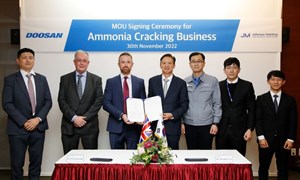News
Johnson Matthey and Doosan Enerbility partner to develop H2-fueled power plants
Johnson Matthey (JM) and Doosan Enerbility have signed an agreement to develop H2-fueled power plants in South Korea. The partnership supports the South Korean Government’s plans to increase the share of clean H2-based power generation from 0% in 2022 to 2.1% by 2030 and 7.1% by 2036.
JM will provide innovative ammonia cracking technology and catalyst, which converts clean ammonia into nitrogen and H2. The clean H2 can then be used to power turbines, which are key components of H2-fueled or H2-LNG fueled combined cycle power plants.
Analysis from the Korea Institute of Machinery & Materials shows that using ammonia cracking technology to enable H2-fueled turbines could reduce carbon emissions by 10.4% when a gas turbine is fired up with 30% H2. It can be lowered to 21.4% when there is 50% H2 present. According to data from IHS, H2 demand in 2030 for power and heat generation is set to be 2.1 MMt–4.6 MMt globally.
Doosan Enerbility’s expects to complete the development of the 380-MW 100% H2 gas turbine by 2027.
Jane Toogood, Chief Executive of Catalyst Technologies at JM, said, “This is a significant step and could lead to a number of industries introducing clean H2-fueled turbines in power plants around the world. Whilst the technology we are developing for Doosan is specifically for the power industry, it could also decarbonize downstream industries through access to low carbon power.”
Hongook Park, CEO of Doosan Enerbility’s Power Services Business Group, said, “Ammonia cracking, which is helping to lower the entry barrier to combined cycle H2 power generation, is a key technology that will contribute to carbon neutrality. This partnership signifies that the entire value chain for combined cycle H2 power generation will be built, resulting in H2 production through to H2 end-users.”


